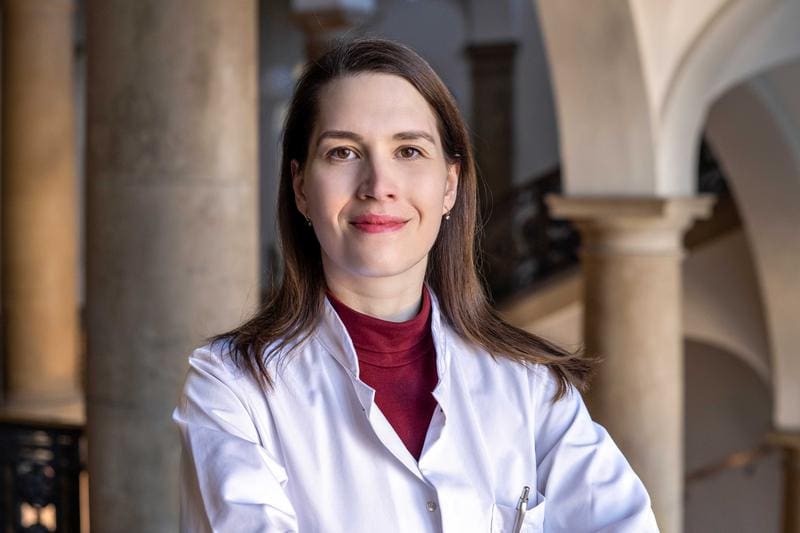Funding stop: Federal government lets heart registry die
The work of the NRAHF is on the verge of collapse: a funding stop threatens the heart registry, which is unique in Germany. Now the new NRAHF director is speaking out – and hopes for rescue at the last second.

Since September 1, 2025, Constanze Pfitzer has been Scientific Director of the National Register for Congenital Heart Defects at the Competence Network for Congenital Heart Defects. The research network is facing a Herculean task. The internationally renowned register for multicentric research has been without state funding since 2025. This causes resentment among patients and their relatives.
For many years, Constanze Pfitzer has been researching with the data of the National Register for Congenital Heart Defects (NRAHF). On September 1, 2025, the specialist in pediatrics and adolescent medicine from the German Heart Center of the Charitûˋ (DHZC) took over the scientific management of the registry and the competence network. The 36-year-old habilitated physician has set herself the task of expanding multicenter and interdisciplinary research with one of the world’s largest data and biobanks for research into congenital heart defects.
Transfer to practice to be accelerated
In Germany, well over half a million children, adolescents and adults live with a congenital heart defect. It is the most common congenital organ malformation. One in 100 children is born with it. “More than 90 percent of newborns today reach adulthood ã even with a severe heart defect. This is an enormous medical advance,” says Constanze Pfitzer.
The number of affected adults is increasing by about 5 percent annually. At the same time, this poses new challenges for medicine and healthcare: “We are dealing with a large number of different diagnoses. Prevention, early detection and treatment must be able to keep pace with the increased life expectancy of patients,” explains the new NRAHF director.
There are still many question marks about the causes and long-term consequences of congenital heart defects. “Long-term research with the NRAHF is urgently needed for this. The rapid transfer of findings into practice is essential. And this could be accelerated considerably with the new digital technologies.” To this end, the doctor is relying on the further digitization of the register. An initial pilot project for AI-supported data collection is already underway ã funded by a private foundation.
Medical registries need secure funding
For many years, the registry has allowed scientists from different disciplines and institutions to find answers to pressing questions together with its wide range of data and samples. Much of this has already been incorporated into guidelines of the medical societies. But maintenance and further development of medical registries cost money. The register spends around one million euros a year on this.
The strictly regulated management of the fiduciary data and samples of over 60,000 voluntary donors is time-consuming. “The many years of state funding from the Federal Ministry of Education and Research played a major role in making this possible until the end of last year,” emphasizes Constanze Pfitzer. But then suddenly the planned long-term financial security failed. The planned connection of the register to a state-funded research institution did not materialize. This means that the future of research with this key resource is currently uncertain.
End of research is not an option
“We are threatened with a dramatic setback. Without secured funding, register-based research will no longer be possible from 2026,” says Constanze Pfitzer. “An end to this research would be unacceptable for us. Not least for the many volunteers who entrust us with their data and samples, the end of the register would be more than bitter. They do this in the justified hope of improved care and quality of life into old adulthood, also for future generations,” explains the scientist and doctor.
Many people do not seem to be aware of what the NRAHF does
The funding freeze is also causing resentment among patients. “We feel abandoned,” says Christina Pack. The 45-year-old lawyer is affected herself and heads the self-help organization for adolescents and adults with congenital heart defects, JEMAH e. V.
Like the approximately 9,000 online and offline signatories of the Bundestag petition “Every Heart Counts”, which was initiated by JEMAH e.V. in association with the Action Alliance for Congenital Heart Defects together with the cardiology societies and the kinderherzen FûÑrdergemeinschaft Deutsche Herzzentren (German Heart Centres Support Association), she hopes for clarification and reason. “Many people do not seem to be aware of what the National Register has been doing for us and society for decades.”
Hoping for rescue at the last second
At the NRAHF, they are not yet giving up hope of rescue at the last second. A new application for further funding has been submitted to the Federal Ministry of Health (BMG). “We hope for positive feedback soon, and that the necessary expansion of digital structures in Germany can also be pushed forward quickly for data-sensitive medical registries,” says NRAHF Chairman Professor Anselm Uebing.
An expert report prepared for the BMG under the government of Angela Merkel lists the NRAHF among the best practice registers. It was already clear at the time that registries such as the NRAHF are indispensable for research into new therapies and for improving and reviewing already established treatment methods. “Every improvement in therapy increases the chance of a long life with a good quality of life and ultimately relieves our health and social system,” emphasizes the Kiel pediatric cardiologist.
Who conducts research with the register? Find the participating clinics on site on the map:
https://www.kompetenznetz-ahf.de/forscher/forschen-mit-uns/wer-forscht-mit-dem-register/
Editor: X-Press Journalistenbû¥ro GbR
Gender Notice. The personal designations used in this text always refer equally to female, male and diverse persons. Double/triple naming and gendered designations are used for better readability. ected.




